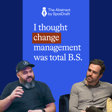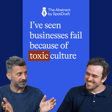
Navigating Public Scrutiny & Adversity as a GC: Mark Marin’s Candid Insights
How do you navigate being in the public eye of a high-profile company? What happens when you become embroiled in a public controversy and your company doesn’t have your back?
This is just one of the themes we will be delving into with Mark Marin, Puffco’s General Counsel, on this episode of The Abstract.
In this incredibly candid conversation, Mark will take us through:
— the challenges he faced during his time at Barstool Sports, a notorious media company;
— the challenges that led him to Barstool Sports, namely a bankruptcy and two different acquisitions at his previous companies;
— and his current role at Puffco, a start-up within the cannabis industry.
Learn what it takes to truly overcome adversity as a GC. This is one episode you don’t want to miss.
Read detailed summary: https://www.spotdraft.com/podcast/episode-15
Topics:
Introduction: 0:25
Jumping into the fast-paced start-up world at Quirky: 2:31
Discovering a silver lining during bankruptcy: 6:40
Navigating being acquired twice in the span of a short time: 10:17
Learning from trying to merge cultures during company acquisitions: 14:58
Grappling with adversity as Barstool Sports’ first General Counsel: 18:50
Finding support during career challenges: 27:20
Venturing a new path in the cannabis industry: 30:40
Parting advice for younger attorneys: 33:17
Resources mentioned in the episode:
Leaders Eat Last by Simon Sinek: https://simonsinek.com/books/leaders-eat-last/
Connect with us:
Mark Marin - https://www.linkedin.com/in/mark-marin/
Tyler Finn - https://www.linkedin.com/in/tylerhfinn
SpotDraft - https://www.linkedin.com/company/spotdraft
SpotDraft is a leading CLM platform that solves your end-to-end contract management issues. Visit https://www.spotdraft.com to learn more.



















